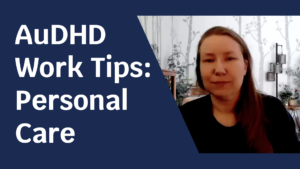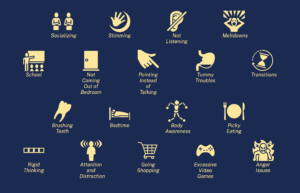Dreaded phone calls
A long time ago, in what feels like a galaxy far, far away, before I knew I was Autistic, I taught high school.
There’s plenty of anxiety examples in that one phrase, “I taught high school,” and I’d like to share one with you.
I really enjoy teenagers, was good at the teaching, and connected well with the kids, but there was a lot in my job description that wasn’t as easy for me. That, in fact, provoked a lot of anxiety.
In the last two years that I taught, before my last burnout, the administration came up with a scheme for preventing at-risk students from failing, by making sure that everyone got weekly calls home if that week’s work was below a C, and to hold teachers accountable for calling.
To divide the workload among the teachers, and so parents would not get multiple calls about their kids from every subject’s teacher, we were each assigned a group of about 30 kids to keep track of, whether or not they were in any of our classes.
We had to check all of their grades every week, call home, and log that phone call on a school-wide spreadsheet that was available for all teachers and the administration to check anytime.
None of my assigned students were in my classes, which meant that I had no information to give their upset parents about what they were struggling with, how to help them, or what was going on.
Every week as the assigned time approached for all the teachers to make their phone calls, my stomach would tie into knots, dreading having to a) pick up the phone, b) initiate a phone call, c) talk to a parent that I don’t know, d) who might not even speak English (and my Spanish was far too limited for this kind of conversation), e) probably interrupting them at work, f) to deliver bad news to an immediately upset parent, g) without having any useful info to give them.
I dreaded those phone calls all week long.
Most weeks, I could not force myself to pick up the phone.
I would pull up the online grade books, and the spreadsheet, and dutifully check my assigned cohort’s grades, and see who I was supposed to call, all the while feeling my stomach knotting up and my throat clenching tight so I couldn’t have talked if I had wanted to, and feeling like I was going to throw up.
I would stare at the computer screen and try to rehearse what to say, but my mind would go blank, and I would try to talk myself into falsifying the log, claiming to have made calls that I didn’t make. Which I only did once or twice because the thought of lying, and separately the thought of getting caught, also churned up further anxiety.
And then I would go home feeling sick and dread next week’s torture. I’d cross my fingers and hope and pray that those students would learn over time and pull up their grades and would not actually end up failing.
And I would rant in my head about how it takes time to absorb material, especially for some students. (There was so much about that weekly, high-stakes reporting that I fundamentally disagreed with as an educator.)
Those phone calls were not by far the only thing that led to burning out, but they were one of the worst parts of that job.
When I, tentatively, sort-of, kind-of, mentioned it to the principal once, who was pretty supportive of making accommodations for me in general, she could not wrap her head around why those phone calls would be an issue.
Since then, I’ve worked through enough of my overall anxiety that it is significantly lower, and I know how to deal with it so much better when it does creep up. I still don’t love phone calls, but I can make them when I need to.
One of the most important things that I’ve learned in my unraveling my own anxiety, is that it crops up most intensely when there is a disconnect between my values or needs and the expectations placed upon me.
And I have better insight now as to what was going on then. One of the most important things that I’ve learned in my unraveling my own anxiety, is that it crops up most intensely when there is a disconnect between my values or needs and the expectations placed upon me.
The whole phone issue aside, I was being asked to do something which was almost guaranteed to put someone else in a state of dysregulation.
Different parents will receive the news that their kid is at risk of failing with a wide variety of reactions and responses to it, but almost none of them will be equanimity, calm, or delight.
I knew there was a distinct possibility that some students might face physical or psychological retribution when they got home. Others might get in trouble in more socially acceptable ways, losing privileges which are their own coping strategies, because of a single missed assignment. When we’re talking about weekly check-ins, a single assignment can make a big difference, especially earlier in the semester.
I fundamentally disagree with normative US grading practices, and my principal and I got into that several times, as I wasn’t grading often enough to suit her, but I wanted to give students time to absorb the material and to work with it in multiple ways before being evaluated in any kind of recorded or lasting way.
Anyway, the idea of delivering bad news without any kind of useful information about what to do to help also strongly went against my values.
And a couple of the students I was assigned came from Spanish speaking homes, and I speak too little Spanish to be useful.
I did force myself to call one of those parents, once, who understood enough to recognize that I was calling from the school about their kid, but we couldn’t communicate beyond that. When you get a call from school, the assumption is that it’s something bad, and I imagined them spending the rest of their day worried or mad, and their kid coming home to that.
I only managed to make a few calls that entire semester. The rest of those assigned call times I sat, staring at the phone in pain, and spent the rest of the week dreading the next Thursday afternoon as if it were torture. (I’m feeling a little of that stomach cramping now as I think back to it.)
But here’s the deal. There’s a lot in that situation that really was painful.
But I was so caught up in the story I had created about kids being punished and hurt, that my brain shut down the ability to even recognize that there could be other ways to handle the situation.
I could have talked to the students to try to get a sense of whether they were scared of the prospect of someone calling home (maybe their parents would be supportive). Or try to get them help with their schoolwork. Or find out why they were consistently struggling.
They weren’t my students, and that would have been extra work for me, but I was already doing a lot of extra work fretting about it.
Sadly, none of those things ever occurred to me until just now as I started to think about what other options there could have been.
Fast forward to the present
A few days ago, I faced making a phone call to someone whom I know, but not well. She wanted to talk about something that I knew would be unpleasant, and I felt that familiar knot in my stomach.
Nowadays, I use that knot as a signal that there’s a painful thought at work. I asked myself, what part of the pain is coming from the actual circumstances, and what part of it is coming from how I’m thinking about it? How am I creating more pain? What are the painful thoughts that I’m adding to the situation?
I’ve done this enough now that the process is pretty straightforward for me and I figured it out in a few minutes, and that released most of the stomach knot, and then I used a couple of my anxiety management tools to calm it a bit more.
It wasn’t that long ago that I would have put off that kind of phone call for weeks, or longer if I could get away with it, all the while dreading it, and agonizing over what the other person was thinking about me.
This time I didn’t do any of that. Okay, I did it for about 10 minutes. But then I texted to confirm it was a good time, and made the phone call, and we talked. The conversation took about a half an hour, and it was indeed somewhat unpleasant, but I managed.
Then it was done.
I didn’t have to keep dreading it.
I didn’t replay it over and over in my mind, either. I’ve thought about it a few times. But that’s different from playing it on repeat in my mind. I have plenty of experience with that. I know the difference.
I didn’t have to keep dreading it. I didn’t replay it over and over in my mind, either.
The techniques I use now to get through uncomfortable conversations and phone calls and to stop myself from replaying them over and over, are exactly what I’ll be introducing in my anti-anxiety course next month.
They’re not hard to learn, but they do take a while to get good at. Which is why I’m building in several opportunities to practice together, both in class and between classes, and to come back with questions.
We can do enough in three weeks to make a good start at it.
If you keep practicing, even intermittently, when you happen to remember, it can make a big difference over time.
We’ll be talking a lot about the fundamental principle of separating the pain of what’s physically going on from the pain of how we’re thinking about what’s going on, and how to identify which painful thoughts are keeping us wrapped up in our heads.
I’ll also be offering at least six practical tools (though I often throw in a few extras, depending on the proclivities of the people who attend) that can be useful in the moment for lowering the intensity enough to deal with whatever is going on.
I’ll be presenting a wide variety of these tools so that you can try them out and hopefully find at least one or two that work for you.
The tools are helpful add-ons to the primary work of defusing the painful thoughts, because sometimes you need something practical, and sometimes you need to understand the essence of what’s going on. I’ll be offering both and we’ll be toggling between them.
There are three live classes, with everything recorded so that if you don’t want to be perceived, or if the timing doesn’t work for you, you can still benefit from your peers’ questions about their real anxieties.
There’s likely to be a fair amount of common ground, and watching others get mini-coached can sometimes provide insight into your own experiences.
If you’re interested and would like to learn more, or check the price or timing, etc, you can find all of that here:




